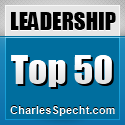Reaction or Reflection – A Leadership Question
Posted on June 25, 2013 by
Thomas White

Recently I was watching the classic movie, Get Shorty. This 1995 picture features an intriguing character, Chili Palmer (played by John Travolata). Chili is a loan shark from Miami who finds a new life as a producer in the movie industry.
What intrigued me about this character was his cool.In every situation he faced, he never reacted to what was going on. Rather, in a deliberate manner, he looked at the truth of the situation and then found a solution that often went beyond the boundaries of his beliefs.
Emotional Rescue
It got me to thinking about the consequences of reacting from emotions when faced with challenging business situations. As leaders, we are the sum of our experiences.Much of how we respond is unexamined and our past is guiding our present responses. ClickToTweetThisIf, in childhood, I had a traumatic experience with someone in a position of power in my life (i.e. parent, teacher), I interpreted the world though this experience. I might now believe that powerful people are going to hurt me.
When I now meet someone who I perceive as more powerful than me, I might either push back hard when they attempt to get something from me or freeze and not know what to do. Whatever my reaction, I am not making a clear choice based upon the present circumstances.
Recalibrating Your Life
Some would say the only way to change this is to go back to re-examine the old experience and make sense of it in the light of being an adult rather than a child. Many will take the route of professional counseling or therapy. This process can be lengthy and taking on one issue at a time.As a leader, you need to find another way to increase your effectiveness in real time. What I’m about to suggest isn’t for everyone.
It works if you are wiling to be honest with yourself and know that great leadership comes from practice.
Getting Really Real
One of our endearing human qualities is that we are great rationalizers. If something is not going our way, we can explain why things are really different than they appear and things are OK – no matter what the reality. This propensity creates challenges, for it glosses over our true experiences, and we are then prone to having the same problems plague us over and over again.Being honest with myself is the only real way to improve outcomes, stop recurrent problems and change myself.It means that I am are willing to be uncomfortable when you look at problems and their source. Often, I find that having a trusted adviser or friend is helpful, for they can see me more clearly, at times, than I can see myself.
The practice required is to look at what’s working and what’s not each day. My recollections get foggy after each day is complete, so it’s important to gain the lessons of each day as they occur.
At the end of each day, I look back and ask this:
- “What worked well today?” and for each answer, I ask “Why?”
- I then ask, “what didn’t work well today?” and to those answers, I ask, “Why?”
Imagineering Better Outcomes
By bringing these lessons to the forefront, I set up the possibility to change my past behavior from reactiveness to considered response. I know the situations where I’m prone to react with some emotion (i.e. anger, frustration, despair, hopefulness). When I notice these situations arising, I remember my tendency to react, and taking a deep breath, I pause before I respond in any way.I become like Chili Palmer and consider what’s happening and then decide the most appropriate response.This simple change in how I understand myself, and the practice of pausing before I react, has impacts on me and the organization I am leading. For my actions set the parameters for all that is possible for the organization.
I owe it to myself and all that I lead to take charge of myself and lead deliberately.So what type of leader are you? Do you tend to be more reactive, or more reflective. Have you “exploded” in the past with an emotional response that you later regretted? If so, how might you learn to recalibrate your thinking and react more reflectively so that others can watch you Be Cool? I would love to hear your thoughts!
**********
Never miss an issue of Linked 2 Leadership, subscribe today.
Learn, Grow & Develop Other Leaders™
———————–

Thomas White is President of the C-Suite Holdings and the CEO Network
Leadership Innovator, Successful Entrepreneur, Technology Inventor, Author
Email | LinkedIn | Twitter | Facebook | Web | Blog
Image Sources:
sharewallpapers.org



